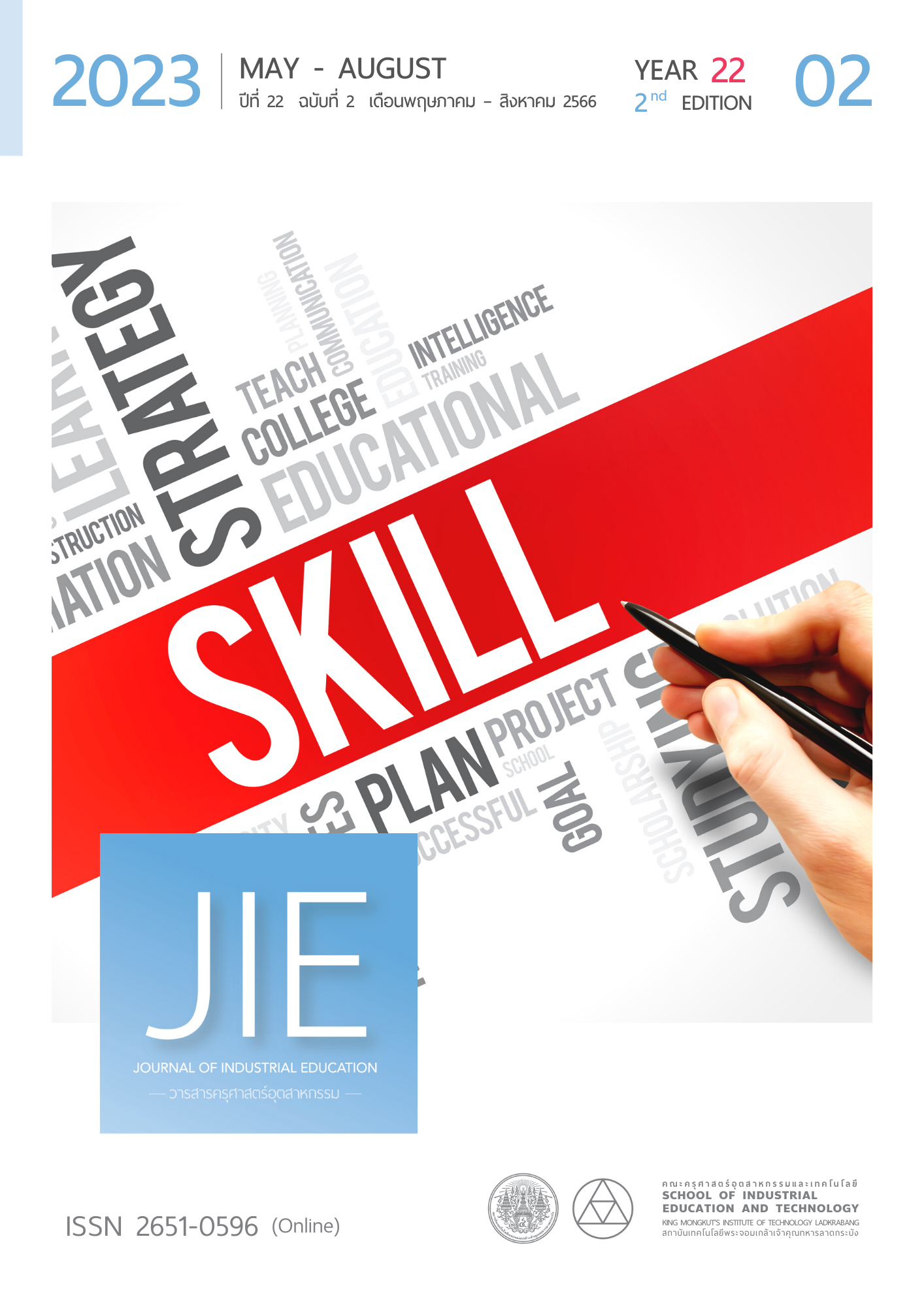การพัฒนาความสามารถในการแก้โจทย์ปัญหาทางคณิตศาสตร์ เรื่อง สมการกำลังสองตัวแปรเดียว โดยใช้การจัดการเรียนรู้แบบปัญหาเป็นฐานสำหรับนักเรียนชั้นมัธยมศึกษาปีที่ 3
คำสำคัญ:
ความสามารถในการแก้โจทย์ปัญหาทางคณิตศาสตร์, สมการกำลังสองตัวแปรเดียว, การจัดการเรียนรู้แบบปัญหาเป็นฐาน, ชั้นมัธยมศึกษาปีที่ 3บทคัดย่อ
การวิจัยในครั้งนี้ได้ใช้ การจัดการเรียนรู้แบบปัญหาเป็นฐานในการพัฒนาความสามารถในการแก้โจทย์ปัญหาทางคณิตศาสตร์ เรื่อง สมการกำลังสองตัวแปรเดียว ซึ่งสามารถทำให้กลุ่มตัวอย่างเกิดความสนใจ มีความสนุกสนาน จึงกระตุ้นให้เกิดการเรียนรู้ได้เป็นอย่างดี กลุ่มตัวอย่างที่ใช้ในการวิจัย ได้แก่ นักเรียนชั้นมัธยมศึกษาปีที่ 3 ภาคเรียนที่ 1 ปีการศึกษา 2565 โรงเรียนเขาวงพิทยาคาร อำเภอเขาวง จังหวัดกาฬสินธุ์ จำนวน 34 คน โดยใช้การสุ่มตัวอย่างแบบกลุ่ม เครื่องมือที่ใช้ในการวิจัย ได้แก่ แผนการจัดการเรียนรู้ แบบทดสอบวัดผลสัมฤทธิ์ทางการเรียน แบบทดสอบวัดความสามารถในการแก้โจทย์ปัญหาทางคณิตศาสตร์ และแบบวัดความพึงพอใจของนักเรียน สถิติที่ใช้ในการวิจัย ได้แก่ ค่าเฉลี่ย ร้อยละ ส่วนเบี่ยงเบนมาตรฐาน และทดสอบค่าที ผลการวิจัยพบว่า 1) ผลการเปรียบเทียบพัฒนาความสามารถในการแก้โจทย์ปัญหาทางคณิตศาสตร์ เรื่อง สมการกำลังสองตัวแปรเดียว คะแนนเฉลี่ยหลังเรียนเท่ากับ 37.76 คะแนน คิดเป็นร้อยละ 75.52 ของคะแนนเต็ม แสดงว่านักเรียนชั้นมัธยมศึกษาปีที่ 3 มีความสามารถในการแก้ปัญหาทางคณิตศาสตร์ หลังได้รับการจัดการเรียนรู้แบบปัญหาเป็นฐานสูงกว่าเกณฑ์ที่กำหนดไว้ร้อยละ 70 อย่างมีนัยสำคัญทางสถิติที่ระดับ .05 2) ผลสัมฤทธิ์ทางการเรียนของนักเรียนชั้นมัธยมศึกษาปีที่ 3 เรื่อง สมการกำลังสองตัวแปรเดียว หลังเรียนสูงกว่าก่อนเรียนอย่างมีนัยสำคัญทางสถิติที่ระดับ .05 3) นักเรียนชั้นมัธยมศึกษาปีที่ 3 ที่ได้รับการจัดการเรียนรู้ โดยใช้การจัดการเรียนรู้แบบปัญหาเป็นฐาน มีความพึงพอใจอยู่ในระดับมาก (= 4.51, SD = 0.43)
เอกสารอ้างอิง
Aiemthong, N. (2017). A comparison of mathematics learning achievement and analytical thinking ability in Matthayomsuksa 5 students using problem-based learning and conventional teaching method [Master’s thesis]. Burapha University. (in Thai)
Baikulab, K. (2019). Effects of problem-based learning activities on mathematics problem solving abilities and mathematics learning achievements on equations of Grade 6 students [Master’s thesis]. Valaya Alongkorn Rajabhat University. (in Thai)
Delisle, R. (1997). How to use problem-based learning in the classroom. Association for Supervision and Curriculum Development.
Evensen, D. H., & Hmelo, C. E. (Eds.). (2000). Problem-based learning: A research perspective on learning interactions. Lawrence Erlbaum Associates.
Jaion, K., & Bangtho, K. (2022). Using problem-based learning approach to enhance student teachers’ lesson design ability for 21st century. Journal of Education Naresuan University, 24(1), 99-109. (in Thai)
Janponto, P., Jaisabuy, K., & Jaion, K. (2020). The development of mathematical problem-solving ability of Matthayomsuksa I students by using problem-based learning. Journal of Education, Prince of Songkla University, Pattani Campus, 31(2), 38-51. (in Thai)
Klinkesorn, K. (2020). The development of mathematics learning activities on ratio proportion and percent by using problem-based learning supplemented with Polya’s problem solving process of Mathayomsuksa 1 students [Master’s thesis]. Udon Thani Rajabhat University. (in Thai)
Kongkham, P., Paladorn, S., & Kongrath, N. (2018). The effects of problem-based learning activities on mathematical problem-solving abilities and learning achievement of surface area and volume of vocational education of the first year students. Rajabhat Rambhai Barni Research Journal, 12(3), 135-146. (in Thai)
Ministry of Education. (2017). Learning standards and indicators for math, science, and geography subject groups in the learning subject group of social studies, religion, and culture (updated edition B.E. 2017) according to the core curriculum of basic education, B.E. 2008. Agricultural Cooperative Association of Thailand. (in Thai)
Mueang Khot, P., Wiriyapong, N., & Chiangpradit, M. (2016). Mathematical problem solving ability using problem-based learning of Mattayomsuksa three students on surface area and volume. Journal of Education, 27(3), 122-132. (in Thai)
Ongate, W., & Thamrongsotthitsakul, W. (2019). The development of learning activities using problem-based learning to enhance mathematics problem’s solving ability and mathematics reasoning ability for Grade 8 students. Journal of Education Naresuan University, 21(2), 285-296. (in Thai)
Panluek, N., & Thipjarasmetha, T. (2019). The development of achievements on about good citizenship through democratic of Mathayomsuksa 2/1 students using cooperative learning with Problem-Based Learning (PBL). SSRU Academic Journal of Education, 4(1), 64-72. (in Thai)
Phochen, W., & Vanichwatanavorachai, S. (2014). The development of mathematics problem solving ability of ninth Grade students taught by problem based learning approach. Silpakorn Educational Research Journal, 6(1), 141-153. (in Thai)
Saduakdee, S., Katthong, T., Pracharung, T., Saikeaw, S., & Phumidet, F. (2022). Results of mathematics learning management by using SQRQCQ strategy together with problem-based learning on similarity of Grade 3 students. RTNA Journal of Social Sciences, Humanities and Education, 9(1), 157-168. (in Thai)
Sisaad, B. (2011). Basic research (9th ed.). Suwiriyasan. (in Thai)
Thorod, N., Angganapattarakajorn, V., & Jenjit, A. (2020). The effects of problem-based learning management with SSCS problem solving model on mathematical problem solving and written communication abilities on Mathayomsuksa 6 students. Social Sciences Research and Academic Journal, 15(2), 87-100. (in Thai)
Wongcharoen, W. (2018). Learning provision using problem-based learning with augmented reality technology to develop analytical and problem solving thinking skills for Mathayomsuksa IV students [Master’s thesis]. Dhurakij Pundit University. (in Thai)
Wongrattana, C. (2019). Techniques for using statistics for research (11th ed.). Amon Printing. (in Thai)
ดาวน์โหลด
เผยแพร่แล้ว
รูปแบบการอ้างอิง
ฉบับ
ประเภทบทความ
สัญญาอนุญาต
ลิขสิทธิ์ (c) 2023 วารสารครุศาสตร์อุตสาหกรรม

อนุญาตภายใต้เงื่อนไข Creative Commons Attribution-NonCommercial-NoDerivatives 4.0 International License.
"ข้อคิดเห็น เนื้อหา รวมทั้งการใช้ภาษาในบทความถือเป็นความรับผิดชอบของผู้เขียน"



